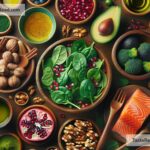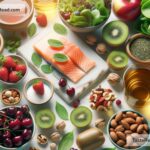Foods for Enhancing Chemoprevention: Simple Tips for a Healthier Life
When it comes to staying healthy, prevention is key. Chemoprevention is the idea of using natural or synthetic substances to reduce the risk of developing cancer. While this might sound like something only scientists talk about, the good news is that many everyday foods have properties that can support chemoprevention. Adding these foods to your diet is a simple step you can take to protect your health.
In this blog, we’ll explore some widely available foods that researchers believe may help reduce the risk of cancer. These foods are not magic pills; they work best when combined with a healthy lifestyle, which includes regular exercise, proper sleep, and managing stress.
1. Cruciferous Vegetables: Nature’s Powerhouses
Vegetables like broccoli, cauliflower, cabbage, and Brussels sprouts belong to the cruciferous family. These veggies are loaded with compounds like sulforaphane and indole-3-carbinol, which may help protect against certain types of cancer. These compounds work by detoxifying harmful substances in the body and supporting DNA health.
How to eat them:
• Roast broccoli with a pinch of olive oil and garlic.
• Make a stir-fry with cabbage, carrots, and your favorite spices.
• Add shredded Brussels sprouts to salads for extra crunch.
2. Berries: Tiny Fruits with Big Benefits
Strawberries, blueberries, raspberries, and blackberries are packed with antioxidants like anthocyanins and ellagic acid. These substances help fight free radicals, the unstable molecules that can damage cells and lead to cancer. Because they’re rich in vitamins and fiber, berries are a refreshing and easy addition to your meals.
How to eat them:
• Mix a handful of berries into your morning yogurt or oatmeal.
• Blend them into a smoothie with spinach and bananas.
• Snack on fresh berries instead of sugary treats.
3. Tomatoes: A Source of Lycopene
Tomatoes are rich in lycopene, an antioxidant famous for its potential anti-cancer properties. Studies suggest lycopene may be particularly helpful in reducing the risk of prostate, lung, and stomach cancers. Interestingly, cooking tomatoes makes lycopene more accessible to your body, so tomato-based sauces can pack a punch!
How to eat them:
• Make a marinara sauce for pasta using fresh tomatoes.
• Add sliced tomatoes to sandwiches or salads.
• Enjoy a bowl of tomato soup on a chilly day.
4. Garlic: The Immune Booster
Garlic isn’t only great for adding flavor to meals—it’s also a powerful ally in chemoprevention. Garlic contains sulfur compounds, such as allicin, that have shown promise in reducing the risk of stomach, colon, and esophageal cancers. Regular consumption of garlic may help reduce inflammation and strengthen the immune system.
How to eat it:
• Add minced garlic to pasta sauces, soups, or stir-fries.
• Roast whole garlic cloves for a creamy and sweet spread.
• Mix raw garlic into salad dressings for a bold flavor.
5. Green Tea: Liquid Gold
Green tea is a popular beverage loaded with polyphenols, including catechins, which are powerful antioxidants. These compounds may help protect cells from oxidative damage and slow the process of cell growth in tumors. Drinking green tea regularly could be a simple way to include chemopreventive benefits in your day.
How to enjoy it:
• Sip a cup of green tea in the morning instead of coffee.
• Brew iced green tea with fresh lemon slices.
• Pair it with a healthy snack like nuts or fruit.
6. Turmeric: The Golden Spice
Turmeric has gained a lot of attention for its active ingredient, curcumin, which is believed to have anti-cancer properties. Curcumin may help reduce inflammation and inhibit the growth of cancer cells. For better absorption, it’s often paired with black pepper, which helps unlock more of its benefits.
How to use it:
• Sprinkle turmeric on roasted vegetables or in soups.
• Make golden milk by combining turmeric, milk, honey, and black pepper.
• Add it to curries or rice dishes for added flavor and color.
7. Whole Grains: Fiber for Health
Choosing whole grains like brown rice, quinoa, oats, and whole wheat bread can support chemoprevention. These grains are rich in dietary fiber, which aids digestion and helps keep your colon healthy. Fiber may help remove harmful substances from the digestive tract before they can cause damage.
How to eat them:
• Swap white rice for brown rice in meals.
• Enjoy oatmeal topped with your favorite fruits.
• Use whole-grain bread for sandwiches.
8. Nuts and Seeds: Tiny Packages of Goodness
Nuts like walnuts and almonds, along with seeds like flaxseeds and chia seeds, are incredibly nutritious. Many contain omega-3 fatty acids, fiber, and antioxidants. Flaxseeds are especially notable for their lignans, compounds that may help prevent certain hormone-related cancers.
How to eat them:
• Sprinkle seeds on smoothies or salads for a nutrient boost.
• Snack on a handful of nuts between meals.
• Add almond butter or peanut butter to whole-grain toast.
Final Thoughts
Eating a balanced diet full of chemopreventive foods is a valuable way to support your health. However, it’s important to remember that no single food can entirely prevent cancer. Instead, focus on creating a healthy eating pattern that includes a variety of fruits, vegetables, whole grains, and lean proteins. Avoiding processed foods, reducing sugar, and staying hydrated are also essential steps in building a long-lasting foundation for good health.
Stay proactive, enjoy experimenting with delicious recipes, and make these foods part of your everyday routine. Small changes can lead to big benefits for your future health. Here’s to eating well and living well!


